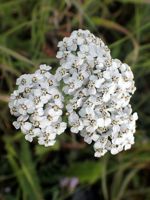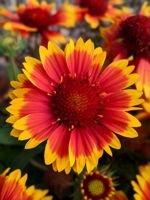Mon-Fri 9am - 5pm Mountain time
Yarrow vs Common Gaillardia
Achillea borealis (Previously Achillea millefolium)
Gaillardia aristata
SOLD OUT
NOT AVAILABLE THIS SEASON - MIGHT RETURN
Yarrow is a herbaceous, native wildflower that is found across Canada. It features large, flat clusters of tiny white flowers. The blooms attract a variety of pollinators, making it an ideal choice for pollinator gardens. While partial shade is tolerated, the best flowering occurs in full sun. Yarrow is resistant to deer and rabbits, making it both a beautiful and practical addition to your landscape.
The entire plant is edible, but leaves and flowers are most commonly consumed. They have a strong licorice scent and a mild sweet flavor that is similar to tarragon. Yarrow leaves can also be used as a natural insect repellent.
It is important to plant Yarrow in the right place, it can spread quickly via both rhizomes and self-seeding. Deadheading the spent flowers will extend the bloom season and can help limit self-seeding.
Common Gaillardia is a native perennial wildflower known for its vibrant, daisy-like blooms. Flower petals vary in color from two-tone blooms with an orange-red center and yellow tips to solid yellow. Blooming from early summer to fall, it provides continuous color while attracting bees, butterflies, and other pollinators. The seeds also serve as a food source for birds, adding to its ecological value.
Common Gaillardia is easy to grow and can tolerate heat and drought. If flowering slows in the summer heat, cutting back the plant can encourage a new round of blooms in the fall. It is ideal for pollinator gardens, xeriscaping, naturalization projects, and ornamental plantings.
Yarrow Quick Facts
Common Gaillardia Quick Facts
Toxicity: toxic to dogs, cats, and horses

